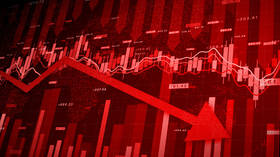Oil prices headed to ‘uncharted waters’ – World Bank
The organization warned millions could go hungry if hostilities between Israel and Hamas continue to intensify
Continued escalation of Israel’s war with Hamas could push oil prices into “uncharted waters,” the World Bank warned in its Commodity Markets Outlook on Monday.
The World Bank cautioned that while the war’s effect on oil prices had been limited thus far, the future “would darken quickly if the conflict were to escalate.” The organization’s report outlined three potential futures based on the level of disruption escalating hostilities might cause in global oil supply.
A “small disruption,” removing 500,000 to 2 million barrels of oil from circulation per day, would be mostly absorbed by the market, the bank predicted. Prices would inch up from the current $90 per barrel to between $93 and $102, canceling out the $9 drop it had previously predicted by next year in the face of slowed economic growth.
A “medium disruption,” the equivalent of the US’ 2003 war in Iraq, could see prices increase between 21% and 35%, with 3 to 5 million barrels per day taken out of supply – leaving oil priced between $109 and $121 per barrel, the report stated.
A “large disruption,” which the bank likened to the Arab oil embargo of 1973, with 6 to 8 million barrels eliminated from supply per day, could see prices surge between 56% and 75%. This would drive the cost per barrel up to between $140 and $157.
Higher oil prices would translate to spiking food prices, exacerbating current food insecurity and causing millions to go hungry, World Bank deputy chief economist Ayhan Kose explained. “If a severe oil price shock materializes, it would push up food price inflation that has already been elevated in many developing countries” as a result of the Ukraine conflict, he said.
Nearly a tenth of Earth’s population – over 700 million people – were undernourished by the end of 2022 due to disruptions in commodity markets caused by the conflict, he added.
World Bank chief economist Indermit Gill urged policy-makers to “be vigilant,” warning that “the global economy would face a dual energy shock for the first time in decades – not just from the war in Ukraine,” which he called “the biggest shock to commodity markets since the 1970s,” but from the Middle East as well if the war in Gaza continues to escalate.
While oil prices have increased 6% since Hamas’ attack on Israel earlier this month, agricultural commodities and precious metals have “barely budged,” the World Bank reported.
Israel expanded its ground assault on Gaza on Monday, with tanks reportedly advancing on Gaza City from multiple directions. Over 8,000 Palestinians have been killed and hundreds of thousands displaced under the most intense bombing of Gaza in Israel’s history.






Comments are closed.